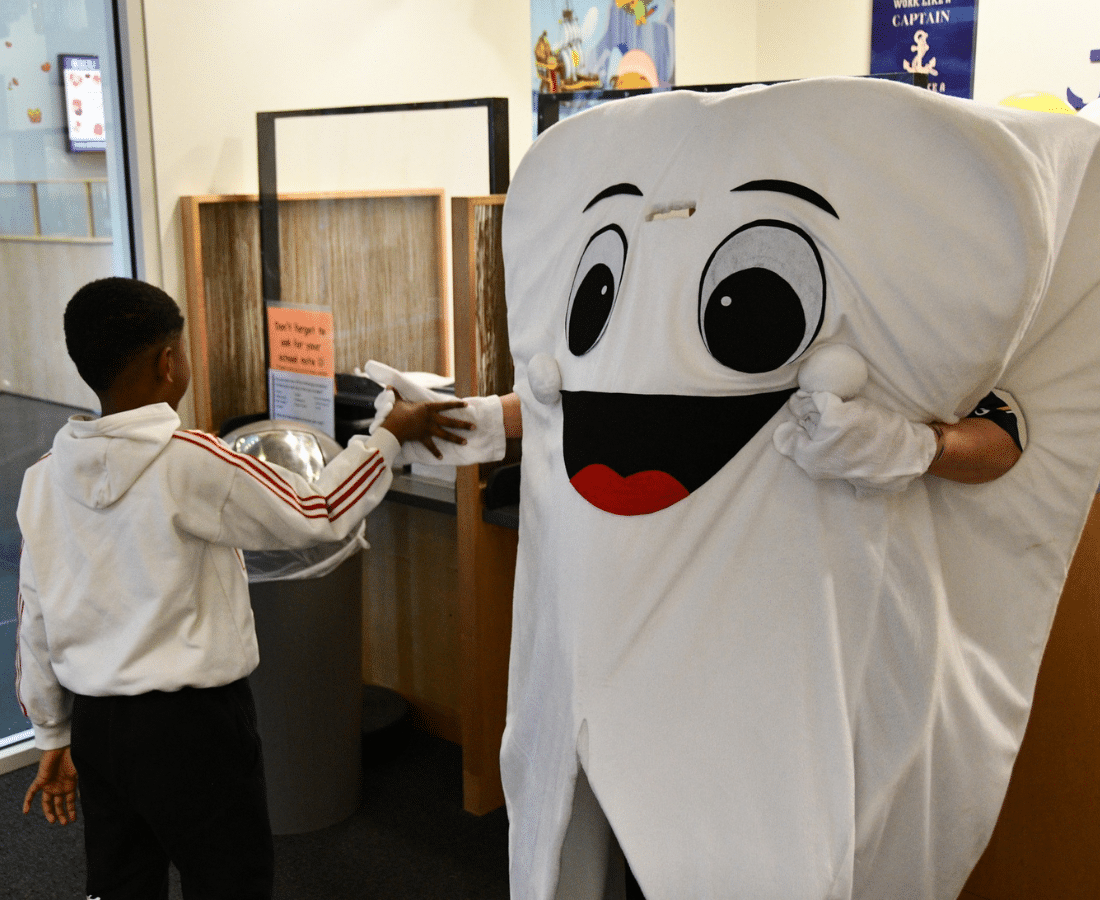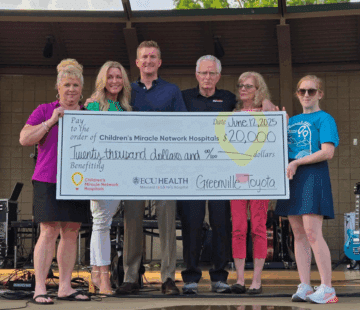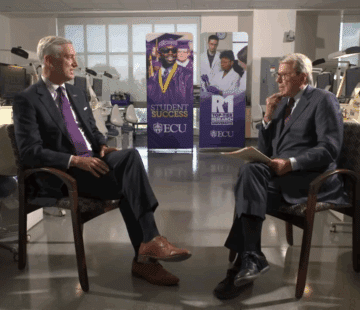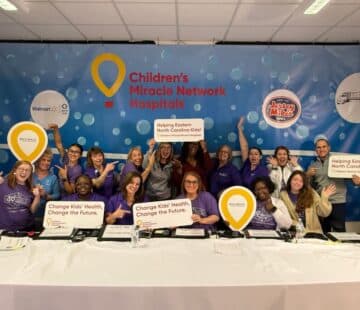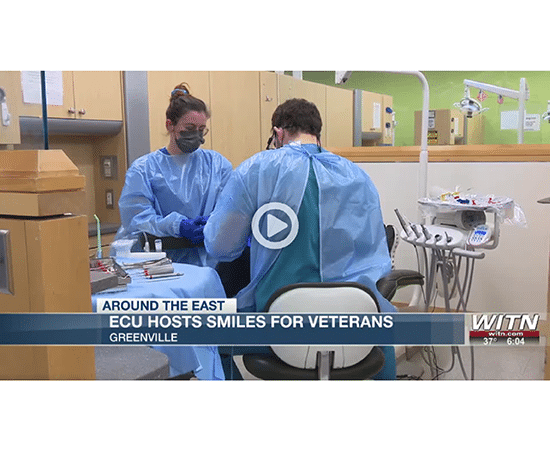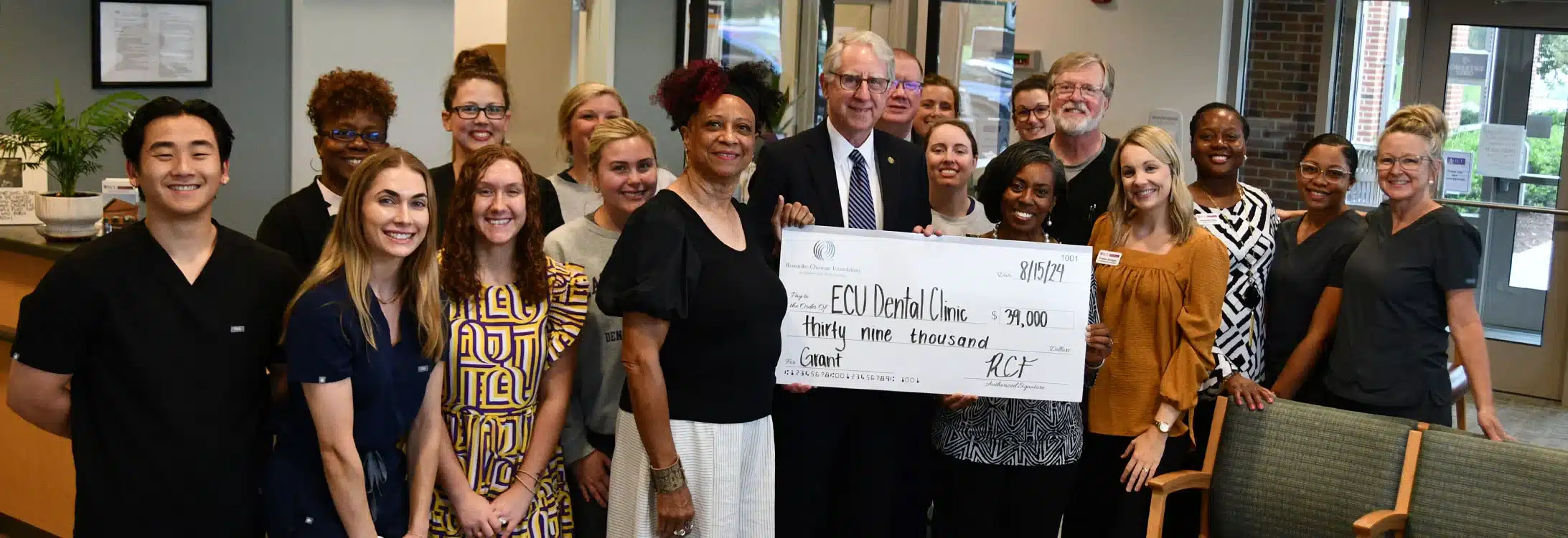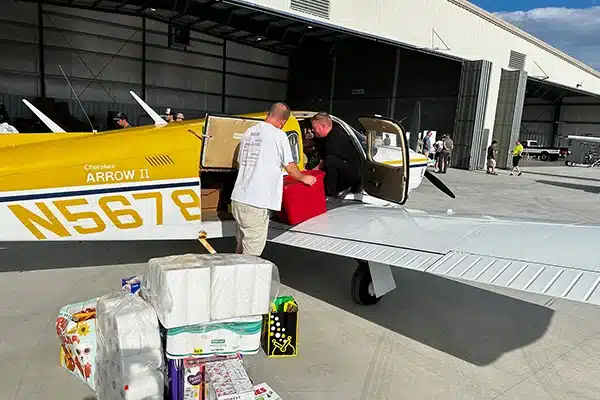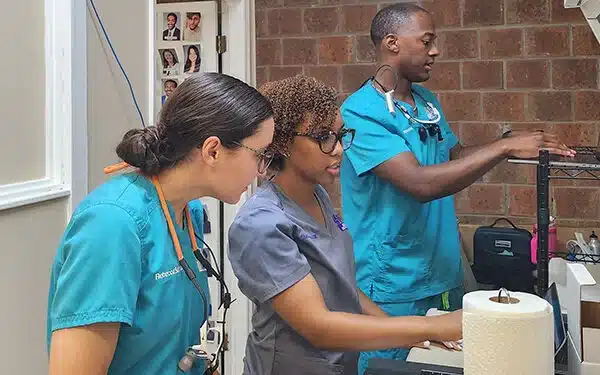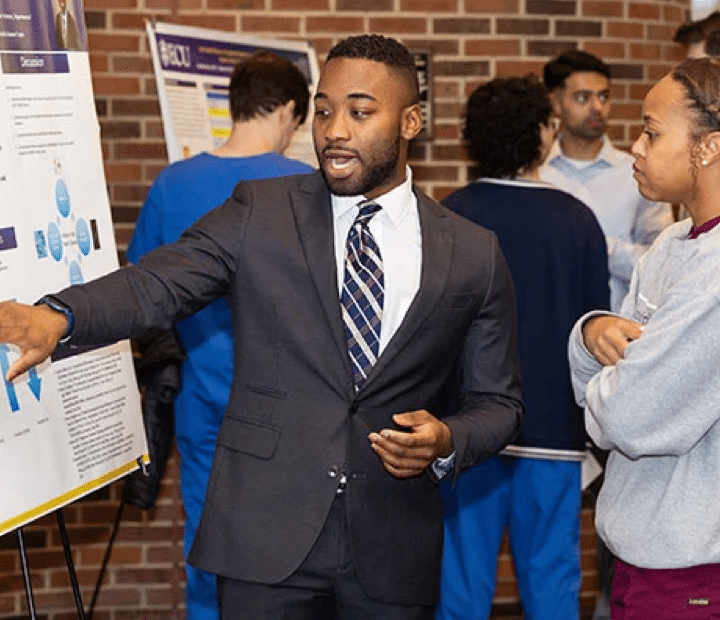The ECU School of Dental Medicine hosted the ‘Smiles for Veterans’ event on Saturday to provide free dental care for veterans. Army veteran Mitchel Hudson says, “It means a lot to have this. A lot of people don’t have these services and I’m glad veterans do because they deserve it.” Dental students and faculty had the opportunity to work directly with patients to provide services.
Aleacia Lee graduated ECU in May 2024 and was able to work with the veterans as an AEGD Resident. “Usually with these events, I was doing assisting or something like that. But now actually doing the care for the veteran, it’s really special. I got a big smile after my patient left today,” Lee says.
Founder and Chairman of Smiles for Veterans David McCracken says the group relies on donations and grants to be able to give back to veterans in need. “The amount of money we get, and I think this is the thing I’m most pleased with, is every single dollar, 100%, goes to some veteran’s mouth,” McCracken says.
As a veteran himself, Dean of ECU School of Dental Medicine Greg Chadwick says its vital to provide dental services to veterans that need it. He says, “We enjoy having this school because of the people that have served in the armed services in years past and given us the opportunities to enjoy the freedoms that we enjoy.” Chadwick says this event was the first in Pitt County but certainly won’t be the last.
ECU says close to 30 veterans were helped during the event, and more than 400 total have been cared for through the program since 2018, receiving more $220,000 dollars worth of care.
Dental health capabilities got a boost at East Carolina University School of Dental Medicine’s community service learning center (CSLC) in Ahoskie through a gift from the Roanoke Chowan Foundation (RCF).
The first-time $39,000 gift from RCF – through the ECU Health Foundation – has allowed the school to secure equipment and resources to offer moderate sedation at the CSLC. Additionally, funds will be used to purchase a new Primescan Connect camera, which will update digital dentistry capabilities, and for nitrous carts, to help with care for pediatric patients.
“This state-of-the-art equipment provides our students and residents with vital exposure to digital dentistry,” said Dr. Greg Chadwick, dean. “This equipment also will help keep patients out of the local hospital operating room for dental surgery, while providing excellent educational opportunities for our students and residents.”
The alignment of ECU’s medical and health sciences and ECU Health helped establish a new relationship with RCF. ECU Health Roanoke Chowan Hospital is one of the health system’s nine hospitals. The foundation became an independent entity from the hospital after alignment.
“Our foundation has a long partnership of supporting the Ahoskie dental clinic through the Roanoke-Chowan Community Health Clinic. The alignment with ECU Health and the ECU Health Foundation provided an opportunity to grow our assistance by giving to the School of Dental Medicine directly,” said Wendy Vann, with RCF. “The school, in turn, can enhance the services they are able to provide in our community.”
Since 1985, the foundation has provided more than $17 million to address health and wellness in the Roanoke-Chowan area, including Bertie, Gates, Halifax and Hertford counties.
Roanoke Chowan Foundation’s gift for the Ahoskie CSLC was made to the ECU Health Foundation, the philanthropic arm supporting ECU Health and ECU’s health sciences campus.
“This gift, supporting the Ahoskie CSLC, highlights the alignment of the health system with the region we serve and our shared purpose to improve the overall health, education and well-being of eastern North Carolina,” said Scott Senatore, Chief Philanthropy Officer, ECU Health Foundation. “The Roanoke Chowan Foundation is a dedicated community partner, and we appreciate their commitment to the CSLC in Ahoskie.”
Days after Hurricane Helene delivered devastation to western North Carolina, Dr. Jonathan Austin answered a phone call — and made good on a promise he made years earlier to serve his community and state.
Austin — a Lincolnton native and 2016 graduate of the East Carolina University School of Dental Medicine — loaded his Piper Arrow plane with much-needed supplies and took off for some of the most hard-hit areas after the storm. Austin’s plane skimmed the clear air above the stricken region, through mist and clouds that soon revealed rivers, lakes and streams swollen beyond their banks. He saw the unrecognizable wreckage of towns and communities and smears of red clay chewed from the mountains by mudslides. But when the wheels of the plane touched down at small regional airports, Austin was met with open hearts and hands, grateful and compassionate people ready to help their communities rebuild.
During his numerous trips delivering supplies, Austin observed the beauty and breaking point of nature — but he also witnessed the strength and spirit of humanity. When he received a phone call imploring him to help deliver post-storm supplies to the damaged region, Austin, who practices at Austin Dentistry in Lincolnton, didn’t hesitate. He first flew into the Jackson County Airport near Sylva on the evening of Sept. 29 and made several more trips during the days following the hurricane, carrying in-demand items from food and distilled water to diapers, insulin and manual breast-milk pumps.
Austin balanced those flights with continuing to provide oral health care to his patients — using his education and life experiences from dental school, the military and dental practice to touch the lives of people whose paths he crossed in the storm’s aftermath. “You know, everybody was kind of helping everybody, and everybody was asking about everybody,” Austin said of the supply flight experience. “There’s people that I think I will probably talk to for the rest of our lives.” Answering the call came naturally to Austin.
A 2004 graduate of West Lincoln High School, he attended Appalachian State University for a time before enlisting in the U.S. Marine Corps and serving two deployments in Iraq. He returned to Appalachian State and earned a bachelor’s degree in cell and molecular biology with a minor in chemistry. After earning his Doctor of Dental Medicine degree from ECU, he fulfilled a personal promise to return to practice in his hometown. “I had always known I wanted to return to my hometown to practice, which lines up with the mission of the dental school,” Austin said, referring to the school’s efforts to educate dentist leaders for North Carolina’s most rural and underserved communities.
Over the years, Austin has kept volunteerism high on his list of priorities, completing eight to 10 hours of service a week, on average. He volunteers with the North Carolina Missions of Mercy, Baptist Dental Bus and Give Kids a Smile. He is a member of the American Dental Association, North Carolina Dental Society, Academy of General Dentistry and the Denver/Lake Norman Rotary Club. He also flew search and rescue during a several-year stint with the Civil Air Patrol. “I was always sort of programmed for this,” Austin said.
“I had always known I wanted to return to my hometown to practice, which lines up with the mission of the dental school,” Austin said, referring to the school’s efforts to educate dentist leaders for North Carolina’s most rural and underserved communities.
Over the years, Austin has kept volunteerism high on his list of priorities, completing eight to 10 hours of service a week, on average. He volunteers with the North Carolina Missions of Mercy, Baptist Dental Bus and Give Kids a Smile. He is a member of the American Dental Association, North Carolina Dental Society, Academy of General Dentistry and the Denver/Lake Norman Rotary Club. He also flew search and rescue during a several-year stint with the Civil Air Patrol. “I was always sort of programmed for this,” Austin said. When it came to coordination and communication, Austin had to wing it.
His first few flights were shrouded in fog and mist, the airport runways closed because of flooding. When the clouds cleared, though, Austin was able to see the true nature of Hurricane Helene’s destruction. He saw a mobile home park compacted into a mountainside; he could make out cars tossed aside like toys. Mud caked broken asphalt and pooled in the lower points, drying and cracking in the sun. “It was just debris,” he said. “It looked like somebody had just flooded everything. It was pretty crazy. The area was just devastated, seeing it from that view.”
For this crisis response, Austin and those helping load supplies on his plane had to ensure balance and weight measurements were precise, being careful not to overload the plane and dividing the supplies into multiple trips. He flew into counties including Jackson and Ashe, flying only briefly over Asheville, one of the hardest hit cities. For the first few days, the airports didn’t even have power, much less assurance that someone would be there to guide the plane in and unload supplies. “We were just worried if there was going to be anybody in the airport, and we hadn’t heard any reports out of it,” he said. “We had to land on the taxiway first, because the runway was flooded.”
But as word spread through the affected communities, volunteers showed up in droves to help unload the supplies and deploy them where needed. Austin said the experience was an opportunity for him to respond with his resources, skills and desire to serve, companied with his overseas deployments. “I’ve seen some things, if that makes sense. It’s similar to when I was overseas to a certain extent,” he said. “You’re sort of programmed for this kind of response and this kind of service to other people.”
Austin said he and many of his dental school classmates stay in touch, from bonding activities like hunting and fishing to working in tandem to benefit their communities. “We’re not afraid to get our hands dirty,” he said. “Several of us in our class knew we would return to our hometowns to practice dentistry and help our communities. With this, I just tried to do what needed to be done.”
When Connie Burleson moved from Sanford, North Carolina, to Swan Quarter in coastal Hyde County, one of her favorite pastimes became driving the back roads and taking in the area’s natural beauty. She navigates the Lake Mattamuskeet and Pamlico Sound wetlands and refuges saturated with birdlife. She passes farmland dotted with soil furrows, both fruitful and fallow. “That’s my joy,” Burleson said, “riding around and seeing things. I’ve been here three years, and there is still always something I haven’t seen.”One thing she and her neighbors in Hyde and surrounding counties can count on is that they, too, are being seen.
For the past two years, the School of Dental Medicine at East Carolina University has operated the Hyde County Outreach Clinic in the back of the Swan Quarter post office building. Students, residents, faculty and staff travel once a month from Greenville to care for patients in a county that currently has no practicing dentists. Burleson has sought care at the office since day one, getting a cleaning and routine follow-up care over the years. “It’s so nice having this so close to home,” she said, “and it’s awesome working with the students because you’re able to help with their education. All of this is helping Hyde County so much, too.”
The ECU dental school also has programs in place in Bertie and Jones counties to address oral health care in schoolchildren, creating a virtual triangle of care that encapsulates rural populations in critical need of dental care and services. These three county-based programs are making strides in reaching patients of all ages in some of North Carolina’s most underserved communities. “Our county-based programs are a testament to the dedication of our faculty, staff, students and residents to reach patients in rural areas where care is needed most,” said Dr. Greg Chadwick, dean of the ECU School of Dental Medicine. “The enthusiasm of our community partners and our patient bases also speaks volumes, validating that what we are doing is not only working, but also serves as a vital part of our school’s mission.” Just over two years ago, a ribbon was cut and a promise was kept.
Today, the Hyde County Outreach Clinic is bustling with patients and providers. Neighbors chat with neighbors while they await their appointments — “How’s the farming?” “How’s the family?” — and seasoned dentists introduce students and residents to the challenges and rewards of rural dentistry.
In 2019, the Anonymous Trust — a philanthropic group that aims to support rural and underserved communities — provided the School of Dental Medicine a grant award of $144,000 for portable dental equipment and personnel to launch the Hyde County Outreach Clinic.
In December 2022, the Hearst Foundations — national philanthropic resources for organizations working in the fields of culture, education, health and social services — approved funding in the amount of $100,000 for the school to provide dental care to underserved, uninsured and low-income rural patients. Portable dental equipment and special patient care funds will allow the school to provide high-quality dental care to North Carolina’s most medically underserved communities, beginning with the Hyde County clinic.
On a Friday in early August, the clinic’s internet was spotty. Without a secure connection, records and images couldn’t be accessed, and the day couldn’t begin. But where there is a problem and a group of dentists, there’s always a solution; usually, it’s an out-of-the-ordinary idea that withstands trial and error. Today is no different.
“That’s how it is, doing dental care in a rural community,” said Dr. Rob Tempel, the school’s associate dean for extramural clinical practices, as he and other providers finally made the vital internet connection. “It’s great for these students to have this kind of experience solving problems.” The experience students gain, he added, shows the level of dedication they have to serving their state now and as they graduate and embark on careers in dentistry. “It’s incredibly fulfilling to know that the students who are selected to attend this school continue to demonstrate and grow their passion to serve rural communities,” Tempel said. “Their positive energy continually refreshes us as faculty to see them genuinely want to do it.” Those fourth-year students are a part of something so much bigger.
Once a month on a Friday, the clinic provides care for anywhere from 15 to 25 patients. Since the clinic’s creation, close to 170 unique patients have undergone cleanings and procedures, keeping them close to home and bypassing the sacrifice of time and gasoline traveling to Greenville or dental offices in other counties. More than 120 dental students have traveled to Swan Quarter to provide care. The office has become part of Hyde County’s primary care team, bridging dentistry with overall health services, a key part of the School of Dental Medicine’s mission.
Fourth-year student Sydney Lewis said the opportunity to serve Hyde County comes during a rotation in the Ross Hall Service Learning Center on campus. “I have been anticipating being able to go to the Hyde County clinic since it was first started,” said Lewis. “I did a simple procedure on one patient that seemed small to me, but this patient told my faculty that their provider ‘must be a magician’ because their denture had not fit great in a while, but now it did. This made me so happy, and I will probably remember that forever.” Experiences like Lewis’s help solidify trust between patient and provider.
“Engaging with the local community helps students understand the importance of building trust and rapport with patients,” said fourth-year student Markus Mosley. “This relationship is crucial in rural settings where health care providers are often integral parts of the community. Participating in community-oriented service-learning projects helps students recognize the broader social determinants of health and the importance of public health initiatives.”
To Luana Gibbs, director of the Hyde County Health Department, the clinic is a partnership that also represents combining state and local resources for the good of the residents. “Vision, desire, support, collaboration and determination have been key,” she said. “First, there had to be the vision and desire to even attempt this type of service model, and I must give props to ECU for that. Multiple people with a passion to help our community have come together and succeeded in this partnership.” That collaboration includes ECU undergraduate students as well. Honors College student and public health major Aaron Mulkey has had the opportunity to observe procedures at the Hyde County clinic, shadowing providers and cementing his aspirations of dental school. “I love the hands-on approach to helping the community,” he said. “The commitment of the ECU dental school sparks passion in my mind.”
Fellow Honors College student and aspiring dentist Melony Grace Hodges serves as coordinator of the Hyde County clinic, gaining valuable insight on the business side of a dental practice. Many of the patients already know Hodges — she grew up a stone’s throw from the clinic and is vocal about her plans to return to her roots and provide oral health care to the community that raised her.
Burleson paused in the waiting area after her appointment and watched as Hodges checked other patients in and handled bills and phone calls. “I don’t know her very well,” Burleson said, “but I sure am proud of her. The dental school’s School-Based Oral Health Prevention Programs also ensure that similar homegrown smiles start out early in life.
Launched in Bertie County in 2019 through a $400,000 grant from the Duke Endowment and in Jones County in 2023, the program places ECU hygienists in select schools to provide oral health care and preventive education to children. The program offers comprehensive dental exams, X-rays, cleanings, fluoride varnish application and dental sealants to all public elementary and middle school children.
The Jones County program is jointly funded by the BlueCross BlueShield of North Carolina Foundation and the Duke Endowment; in addition to planning funding, the school received a $400,000 implementation grant in late 2022. For the past two years, the Delta Dental Foundation has provided a grant to offset the cost of care for uninsured children. The Bertie program is now self-sustaining through insurance, while Jones county’s is still grant-funded. Costs are also significantly reduced by the use of teledentistry, through which hygienists in the schools can connect with dentists on campus to discuss and diagnose cases.
“Seeing the students get more confident in their smiles and actually getting problems addressed is really rewarding for all of us,” said Rachel Stewart, dental hygienist and supervisor of the School-Based Oral Health Prevention Programs. Over time, Stewart has seen children become less apprehensive about receiving dental care, making it easier for parents to seek additional care in dental offices close to home. “Some of them do already have a lot of dental conditions and things going on, but we’re able to provide care in an environment where they’re already comfortable,” she said. “I think it lessens the anxiety, and now 99% of the time they’re excited.”
To date, more than 1,300 children have been served across Jones and Bertie counties, according to Stewart, including nearly 6,000 appointments during which more than 16,000 procedures were completed. Of the children served, 76% are on Medicaid — easing the challenges of patients connecting with Medicaid providers in rural counties — while 20% are uninsured and 4% have the cost of care covered privately. Most children enrolled in the programs are between 4 and 12 years old and range from kindergarten to 12th grade.
“The impact on the kids continuously grows as we are building relationships with the children, the schools, parents and community,” said Gina Hamilton, one of the school’s public health dental hygienists who cares for patients in Bertie County schools. “We are building trust and helping the children develop healthy habits.” The School-Based Oral Health Prevention Programs are also led by dental school faculty member and principal investigator Dr. Wanda Wright, along with faculty members Drs. Michael Webb and Vanessa Pardi.
“Most dental diseases are preventable, but many children unnecessarily suffer from dental disease because of lack of access to dental services and inadequate home care,” Wright said. “Poor oral health can have a detrimental effect on children’s performance at school and on their quality of life. Ensuring that students have preventive oral health services in school is important in helping them stay healthy and ready to learn.” Educational leaders in Bertie and Jones counties are also celebrating the strengthening collaborations. “This partnership is totally aligned with the district’s strategic plan as we try to ensure that our students have increased academic, social and emotional outcomes,” said Dr. Otis Smallwood, superintendent of Bertie County Schools. “Research tells us that poor oral health in students could lead to decreased academic outcomes, so we are very fortunate and proud of this partnership with ECU School of Dental Medicine.”
Pardi said the programs’ benefits extend to unique clinical experiences for students and exposure to potential careers for schoolchildren. The multi-dimensional benefits of the dental school’s county-based programs not only meet the school’s mission but stand to change the lives of all those involved — from patients young and old to dental students themselves. “Having grown up in a rural county, I’ve always felt a deep connection to these communities and knew that I wanted to give back by practicing in a similar setting, or ideally, in my hometown,” said fourth-year dental student Rebecca Sutton. “The Hyde County clinic provided me with my first experience providing care in a rural area, which was profoundly rewarding and solidified my passion for serving the place that shaped me.”
Dr. Michael Granet has provided more than patient care and dental instruction as an adjunct assistant professor at the East Carolina University School of Dental Medicine’s community service learning center (CSLC) in Brunswick County.
Through gifts totaling more than $100,000, Granet has invested in and helped the school obtain state-of-the-art equipment for the CSLC. Granet, the staff and dental students at the CSLC now have access to a cone beam computed tomography (CBCT)/panoramic X-ray unit, which provides 3D imaging; a TRIOS intraoral scanner and CoDiagnostix software; and a 3D printer. The cutting-edge equipment allows the care team to provide scans for dental imaging instead of having to take impressions.
“Technology is at the forefront of dental education now more than ever before, and Dr. Granet’s gift of this state-of-the-art equipment provides our students and residents with vital exposure to digital dentistry,” said Dr. Greg Chadwick, dean of the dental school. “This gift, coming from a part-time faculty member, leverages our ability to expand the scope of care for the communities we serve.”
Dr. Dianne Caprio, clinical assistant professor at ECU and director of dentistry at the Brunswick CSLC, said dentists can create a virtual model of patient’s teeth or print the model if needed. “Dentistry has gone digital, and we are just scratching the surface of all the possibilities,” Caprio said. “Having this equipment offers the students and residents an introduction to the digital dental world.”
Caprio said the new equipment allows staff the ability to design crowns, dentures and other prosthetics on the software and print them in the office. “We can plan for accurate placement of implants using the CBCT, TRIOS and the CoDiagnostix software by designing surgical guides and printing them in house,” she said.
Granet learned about the CSLC after moving to Wilmington from Maryland. He works at the center each Tuesday caring for patients’ periodontic and implant needs and serving as an instructor for the dental residents working there. “I made donations to the clinic so this equipment could be here and we could all use it and patients could benefit from it,” Granet said. “All I did was give the money. What I get back is much greater than the money I give. I am in a happy place when I get here (Brunswick CSLC) on Tuesday.”
Staff at the CSLC honored Granet for his support with a plaque at the center. Caprio said the upgrade in technology is important to the CSLC, but Granet’s “greatest gift is his time and dedication to teaching the residents and students.”
The East Carolina University School of Dental Medicine held its ninth annual Celebration of Research and Scholarship (CORAS) Feb. 7, showcasing student, resident and faculty research and welcoming two keynote speakers who spoke to the event’s theme, “AI in the Dental World.”
More than 50 research posters dotted the Ross Hall rotunda throughout the morning while the researchers stood by to explain their methods and findings to visitors from the school, university and other institutions.
The event is one of the school’s central traditions, honoring research as a key part of its mission and vision.
Dr. Margaret Wilson, vice dean and interim associate dean for student affairs, welcomed visitors and participants to the event and emphasized the importance of research and scholarship to the ultimate benefit of patients.
“It’s important that we pause and reflect on the opportunities that we all have as educators and learners to improve oral health and overall health for all communities,” she said. “Research plays an essential role in improving oral health — and in order to make progress and create new knowledge, we need to have dedicated faculty who are involved in research, engaged in scholarly activities and committed to inspiring curious students and residents, enabling and encouraging them to develop a passion for discovery.”
Dr. Sharon Paynter, ECU’s acting chief research and engagement officer, said the event is part of the university’s growing research enterprise.
“Last year, the university recorded more than $85 million in sponsored activities — an all-time record,” she said. “We are investing in startup packages, high-impact experiential learning for students who participate in research efforts, catalyzing research teams and ideas, high-performance computing resources and other critical research infrastructure. The ways that the School of Dental Medicine has engaged in that growth and investment strategy is evident at events like this one. It is through events like CORAS that the magic happens.”
Dr. Alexandre Vieira, the school’s associate dean for research, said that research should be considered an essential part of dental education.
“Research should be in the fabric of everything we do,” he said, from education to serving as clinicians to making a difference in communities. “We are part of the same mission.”
Keynote speakers were Dr. Donald A. Tyndall, professor of diagnostic sciences at UNC Chapel Hill’s Adams School of Dentistry, who presented “AI and Diagnostic Imaging in Dentistry: A Rising Tide That Lifts All Boats,” and Dr. Jin Xiao, associate professor and director of perinatal oral health at the University of Rochester’s Eastman Institute for Oral Health, who presented “Smart Connected Oral Health Community (SMART Teeth): Using AI and Digital Technologies to Close the Gap in Oral Health Disparity.”
Students and faculty also received awards during the event, including the following honors:
- Case Reports: Areej Hussein
- Clinical Research: Asha Sude
- Community/Epidemiology Research: Lucy Anna Sheaffer
- Basic & Materials Research: DaQuan Mebane
- Scholarship of Teaching/Mentoring: Dr. Michael Webb
- People’s Choice Award: Markus Mosley
- Hinman Research Symposium Award: DaQuan Mebane
- SCADA Award: Liam Hopfensperger
- AADOCR Research Day Award: Markus Mosley
Lisa Finch, office manager in the Office of Research and CORAS organizer, said the event underlines the importance of research as part of dental education.
“Research is simply important; it is important for the overall health of our community,” she said. “This is part of our mission to lead the nation in community-based oral health education, research, patient care and service. It is important for the school to celebrate student research because our students and residents are the next generation that will continue to build upon the blocks of our health and well-being.”
Dental students shared their thoughts on the value of research and CORAS as part of their dental education.
“The acknowledgment not only affirmed our hard work but also highlighted the effectiveness of our presentation in capturing the audience’s attention and interest. Winning these honors provided a sense of accomplishment and inspired us to continue striving for excellence in our academic pursuits,” said Mosley of being honored with awards for his work, alongside co-author and dental student Erika Stevens. “Being the first time presenting our findings, we were slightly anxious about communicating with our dean, faculty and peers. To our pleasant surprise, after all the hours of planning with Dr. (Wenjian) Zhang, we demonstrated our aptitude for delivering insightful research with unwavering confidence and enthusiasm, showcasing a profound mastery of the subject matter.”
Mebane said the opportunity to research alongside faculty offers unprecedented experiences.
“The opportunity to share my findings on hypertension, a topic that intersects with dental health in significant ways, with peers and mentors was both an honor and a learning experience,” said Mebane, class of 2027. “Oral health has an inextricable connection to systemic health. A large part of the mission of our dental school is to serve the underserved rural areas of North Carolina. Older age is a major factor that increases the odds of developing hypertension, making a deeper understanding of this condition invaluable for us as future clinicians.
I.J. Okons, a member of the class of 2025, has presented her research every year since starting dental school.
“It provided an opportunity to showcase the culmination of our efforts and present our findings to a broader audience,” Okons said. “It’s also gratifying to see our work acknowledged and appreciated, especially knowing that it has the potential to make a positive impact on prenatal oral health education for pregnant women and their prenatal providers. Research is crucial for me as a future dentist because it allows me to stay actively engaged of emerging technologies and advancements in dentistry. It empowers me to engage with the community and comprehend the impact of our efforts on prenatal oral health education for both expecting mothers and their prenatal providers.”
Mike Sheppard was a part-time drummer, keeping the beat to his band’s classic rock tunes during gigs in and around his hometown of Canton, North Carolina.
But that musical rhythm was interrupted by a different kind of tempo — the throbbing pain that he almost constantly felt in his teeth and mouth. That’s when Sheppard had to set down his drumsticks.
He sought help at the East Carolina University School of Dental Medicine’s community service learning center (CSLC) in Sylva, where he received care during the school’s ECU Smiles for Veterans event in December.
“It’s been life-changing,” Sheppard said.
He and more than 100,000 patients have received care through the School of Dental Medicine’s on-campus and hospital clinics, CSLCs and community program sites across the state — an achievement that goes well beyond a headcount, but is instead measured by smiles restored.
“Celebrating this milestone is not just about a number,” said Dr. Greg Chadwick, dean of the ECU School of Dental Medicine. “It is about educating the next generation of dentists as we provided much needed care to 100,000 North Carolinians, many of whom may not have had access to this care if it were not for our community service learning centers across the state and our supporters and donors who have been there from the beginning.”
The School of Dental Medicine opened its doors to students in 2011, driven by a mission of preparing dentist leaders and increasing access to oral health care for patients across the state, especially in rural and underserved communities. Since 2012, the school’s model has expanded through the creation of the CSLCs and innovative programming that reaches more patients where they are.
“This is a landmark moment for ECU and the School of Dental Medicine,” said ECU Chancellor Philip Rogers. “This is not only a milestone, but also a mile marker, as we are just getting started. It is a reminder that we are upholding a promise we made to the people of our state to prepare new dentist leaders and increase access to oral health care for patients everywhere, including our most rural communities.”
Over the course of his visits to the CSLC-Sylva, Sheppard received partial dentures and repairs to cracked and broken teeth. The difference, he said, has been evident in daily life.
“Before, I was in lots of pain; at least two or three days a week I’d be functioning with really bad pain,” he said. “Now, I feel 100% better than I did.”
Sheppard has also returned to his music.
“Since last year, we’ve done seven gigs that I hadn’t done for years before because of the pain,” he said. “I can do this again and not have to worry about the pain and embarrassment. If affects the way you perform. When you can smile and you couldn’t before, it’s confidence — and confidence can lead to other things.”
‘A mutually beneficial setting’
“When I first heard ECU School of Dental Medicine has treated 100,000 across the state, my first response was, ‘Wow!’ This accomplishment is incredibly impactful to all of North Carolina, and knowing I was a small part in that, is very special,” said Dr. Jennifer Vrikkis ’16, who practices at Reynolda Smiles Family Dentistry in Winston-Salem. “I can’t believe it’s been several years since leaving formal education and starting my journey in private practice, but I still feel like I’m a part of ECU with the same mission to serve our community.”
An important piece of the school’s model is recruiting and educating students who have shown the desire to make a difference for North Carolina through dentistry. These students and alumni come from all over the state, bringing with them a passion for caring for others through creative and daring initiatives.
Close to 90% of ECU School of Dental Medicine graduates practice in North Carolina, a number that could be impacted by the school’s unique model of care. During their fourth year, students gain experience at three of the school’s eight CSLCs across the state, as well as clinics in Ross Hall, the school’s campus facility.
That model not only provides a wider variety of clinical experiences for students, but more opportunities for patients to receive care.
Dr. Robert Pinner ’21 runs Pinner Family Dental in Greenville and considers the latest milestone a win for students and alumni from the school’s first days.
“Though I’m just a small link in a long chain of participants, it gives me tremendous satisfaction to see all we have collectively accomplished,” Pinner said. “This mutually beneficial treatment and learning setting—and the doubly positive outcomes it provides—is really the overlooked ‘secret sauce’ that sets our students apart. Upon graduating, our students are ready and prepared to go practice dentistry at a high level. Building this model was intentional and took a great deal of forethought and diligence.”
Dr. Roopwant Kaur, assistant dean for engagement and clinical associate professor of operative dentistry, said the milestone is a testament to the school’s commitment to delivering care based on a proactive and assertive approach, “demonstrating commitment to pioneering and innovative strategies in addressing complex health care challenges.
“This remarkable accomplishment serves as a shining example of our unparalleled success in balancing our core educational mission, impactful community service initiatives and unwavering dedication to clinical excellence,” she said.
Dr. Jasper Lewis Jr., a Greenville pediatric dentist who supported and guided the dental school’s creation, said the school is going beyond the mission and vision it was first founded to achieve.
“Our students are exposed to the same curriculum as other schools, but in a model that gives them a broader exposure to dental needs of all types of patients from a large variety of educational and financial backgrounds across the state,” said Lewis, also the namesake of the school’s first endowed professorship. “Students are taught not only the didactics and mechanics of dentistry, but how to be efficient for the patients as well as themselves. This helps them to see more patients in a given time at less expense to both the patient as well as the provider.”
The mountains-to-coast approach
The state motto of North Carolina is a poignant yet bold call “to be, rather than to seem.” ‘To seem’ is stationary. ‘To be’ is a journey, a calling.
The School of Dental Medicine’s mission has long been less about words and more about works — finding ways to tangibly reach more patients while preparing dentist leaders eager to care for a state that needs them. The school is built on a combination of hope, grit and determination that intersect at a crossroads of better health and better lives.
“Over the years, our students have not only learned to care for the patients they interact with, but they have also nurtured their inherent desire to serve,” said Dr. Margaret Wilson, vice dean and interim associate dean for student affairs. “Our students and alumni are living and working our mission, and their hard work shines through this meaningful milestone. Each of them has left a mark on our school, and in turn, on the patients they care for and in the communities where they make a difference.”
The CSLC system, an award-winning model that includes centers in Ahoskie, Brunswick County, Davidson County, Elizabeth City, Lillington, Robeson County, Spruce Pine and Sylva, each sprung from roots carefully cultivated in their communities spanning regions, demographics and distinctive needs. These centers serve as the school’s “secret weapon” against the challenges North Carolina faces in oral health care — aging dentists, remote locations, lack of insurance or means of funding care and other challenges specific to communities, families and patients.
“Seeing the plan unfold from the perspective of the community service learning center has been an enriching experience,” said Dr. Ford Grant, faculty director of the CSLC-Ahoskie. “From my pre-ECU perspective, it is remarkable that 100,000 patients have been cared for since the first patient was seen in Ahoskie in July 2012. How would these patients have received care without the school? It is a humbling thought as we celebrate this milestone.”
Grant said the number also signifies that there is a long way to go still.
“So many more of our North Carolina citizens still have access to care issues,” he said. “The main campus at Ross Hall and the rural-based community service learning centers can only meet some of the unmet dental needs of the state. ECU’s model is in a great position to support dentists in rural locations through continuing education and community service projects. Being involved in underserved areas can help lift up communities by providing much-needed dental care and has encouraged young people in rural areas to seek careers in the health professions. We hope our staff, students and faculty interacting within the community continue to help inspire others.”
Caring for special populations
When Bruce Hair started having dental issues, he stopped talking. He didn’t want to meet new people or be put in a position to hear jokes or ridicule.
Hair, of Franklin, North Carolina, had dealt with a broken front tooth for more than a year when he sought help at the CSLC-Sylva through ECU Smiles for Veterans.
“I am so happy with the outcome,” Hair said. “When I was missing that whole front tooth, I was uncomfortable around strangers and anywhere for that matter. I just let it get to me in a personal sense. I had stopped smiling; my life was just kind of closing in.”
These days, he can be himself again.
“Now that I can smile and look at people and talk in a normal way, I’m just a lot happier,” Hair said.
Hair and other patients who are considered part of special populations — veterans, children, the elderly, those with special care needs — have found more accessible oral health care thanks to the school’s programs focused especially on them.
In addition to ECU Smiles for Veterans, the school offers the Sonríe Clinic for migrant farmworkers, school-based dental programs in Bertie and Jones counties and a monthly clinic in Hyde County, among other volunteer and outreach programs. Since 2020, the school-based programs alone have provided more than 12,000 preventive and diagnostic services to over 1,000 children in Bertie and Jones counties who have extremely limited access to care, said Rachel Stewart, supervisor of school-based oral health prevention programs for the School of Dental Medicine.
“Being on the front lines of these programs is an amazing opportunity to connect with patients and community members,” Stewart said. “By staying immersed in the community, we can see the changes as they happen and connect with community members and leaders to learn how to best serve the children of the county. Not only do the programs provide clinical services, but we also provide oral health education and supplies to each child.”
Third-year dental students develop age-appropriate presentations that they present in each county as well, improving the oral health literacy of the children while also helping the dental students develop their passion for working in underserved communities.
Faculty and student research also leads to reaching more patients and finding more innovative ways to care for them; the school’s research base is expanding and taking advantage of resources, grants and partnerships across the state and nation. Special needs care capabilities are also expanding through state allocations and other funding.
The growth in these areas keeps some students confident that their ECU School of Dental Medicine experience is preparing them to care for the next 100,000 patients.
“Being a part of the school has been an inspiring journey,” said fourth-year dental student Cherina Jo McKnight. “I knew that committing to this school would teach me the keys to unlock many doors closed to underserved populations. I believe that one of the most rewarding aspects of becoming a dentist is making a difference in someone’s life while doing something I truly love.”
Chadwick said the momentum is building for the school’s most fruitful years to come.
“Each of these 100,000 patients is a North Carolinian, a part of our dental school community and a face that represents our mission and vision,” he said. “We are grateful to them for entrusting their care to us — and we look forward to restoring and creating even more smiles across the state as we enter the next chapter in the life of our school.”
Fourth-year East Carolina University School of Dental Medicine student William Via’s rotation at the school’s community service learning center (CSLC) in Spruce Pine handed him the opportunity to care for a group of veterans during the center’s inaugural ECU Smiles for Veterans event.
It was an experience he won’t soon forget.
“I never have worked with a more appreciative group of patients that also deserve the most appreciation themselves,” Via said.
While it was the first ECU Smiles for Veterans event at the CSLC–Spruce Pine, the school has hosted events through the program since 2018. It partnered with western North Carolina veterans organizations to host the inaugural program 95 miles southwest of Spruce Pine at the CSLC–Sylva. Prior to the Spruce Pine event, the ECU Smiles for Veterans program had provided more than $125,000 of care to more than 275 veterans.
The program was created to reach veterans who have not had access to dental care in the past, part of the school’s efforts to prioritize special populations within its communities. The event provides preventive care and necessary procedures — from fillings to extractions and more — at no cost to the veterans.
In 2018, school leaders joined forces with local veteran services organizations, NC Serves Western and Smoky Mountains Outreach Foundation — now Veteran Smiles Foundation — which provides education and financial support to veterans in North Carolina who want to improve their oral health. As the program has grown and expanded from Sylva to the CSLC–Brunswick County and those in Lillington and Spruce Pine, the Delta Dental Foundation has also become a sponsor through its mission to expand equity in oral and overall health by partnering with community programs.
The community also pitched in to make the day a success. DT’s Blue Ridge Java offered coffee and refreshments, United Community Bank brought lunch, Image Dental Arts provided some partial dentures and local Robert Bailey delivered laser-edged flags to show appreciation to the veterans.
An ECU Smiles for Veterans Patient Care Fund has also been created to help support the program.
ECU Smiles for Veterans events are held throughout the year, and fourth-year dental students completing one of their nine-week rotations at the school’s eight CSLCs might find themselves in the middle of one of the school’s strongest traditions.
“Within the first week of our arrival to the clinic, the whole staff was meticulously planning the event,” Via said. “It was immediately evident to me that the ECU School of Dental Medicine’s Spruce Pine clinic had a passion to serve our country’s veterans. Their foresight and effort could be seen and felt by every veteran patient that participated in the event.”
During the event in Spruce Pine, faculty, students and residents provided $10,000 worth of care to 15 veterans, supported by an enthusiastic office staff.
“Our veterans are a special group of people. They served our country, and through our Smiles for Veterans Day, we get to serve some of them,” said Gene Self, business services coordinator at the CSLC–Spruce Pine. “It was awesome to hear about their tours of duty and to get to hear their stories. The event strengthened our connection by meeting our mission ‘to serve.’”
Self said the event was made more meaningful by the faculty and staff who made the trip from Ross Hall, the dental school’s campus facility in Greenville, to help provide care.
“Serving patients like these and making a difference in our community is one reason I love working at ECU School of Dental Medicine in Spruce Pine,” he said. “Through our partnership with Veteran Smiles and other community partners, we are able to care for underserved patients and make care more accessible for those who need it. Having a positive influence in the lives of people in our community is one thing that drew me to School of Dental Medicine in the first place.”
Charles F., a veteran who received care during the Spruce Pine event, said the care he received that day is already making an impact.
“It’s going to change my life; I can actually smile now,” he said, detailing the procedures he had completed. “I’ve been trying to get care for my teeth for over two years. This is a lot of work, and I’m so thankful for it.”
Via said participating in the event was an experience he will carry with him as he cares for future patients.
“Every patient had an individual story that fit into a collective love and appreciation for our country. I am so thankful to have been a part of that service day. When a service event goes so well, it makes me ready for the next opportunity to do even more.”
He said the event was also unique because many of the school’s faculty who lead the ECU Smiles for Veterans events are veterans themselves who are also active in carrying out the school’s mission of opening doors to dental care across the state.
“Having faculty and administrators that have dedicated their careers to service through the Armed Forces brings an excitement that is hard to describe,” he said. “The service events that the school is able to hold emphasizes the immense need in North Carolina communities, a need that ECU School of Dental Medicine works so very hard to meet.”
The East Carolina University School of Dental Medicine is able to support more rural underserved North Carolinians with dental care needs thanks to a first-time gift from The Leon Levine Foundation.
Through the $60,000 gift, supporting the patient care funds program, more patients can receive care at the SoDM’s community service learning centers (CLSCs) and clinics throughout North Carolina. Patients who qualify are able to get low-cost dental procedures and preventive care through the program.
“We are honored to receive support from The Leon Levine Foundation as we work to fulfill our mission of serving the people of North Carolina,” said Dr. Greg Chadwick, dean of the ECU School of Dental Medicine. “Generous grants in support of patient care funds allow us to serve even more patients in rural and underserved communities through our CSLCs. We are also better able to provide our students with high-quality educational and clinical experiences and create innovative solutions to the oral health challenges in our region and state.”
For more than a decade, the CSLCs have allowed the dental school to achieve its mission to develop leaders with a passion to care for the underserved and improve the health of North Carolina and the nation. The SoDM has earned national awards for its innovative model of education and patient care.
“We believe that equitable access to quality healthcare – including dental care – enriches the wellbeing of individuals and their families. In light of this, The Leon Levine Foundation is honored to support the patient care funds program through ECU’s School of Dental Medicine,” said Dr. Michael Richardson, senior program officer of healthcare. “These resources directly help underserved and uninsured patients, resulting in healthier communities.”
Richardson said Levine cared deeply about establishing pathways from poverty to self-sufficiency. Providing access to affordable treatment through the CSLCs allows patients to face one less barrier to economic mobility.
“While North Carolina has faced a shortage of dentists in recent years, especially in rural communities, we are confident that ECU’s School of Dental Medicine will positively impact dental care trends in the region in the years to come,” Richardson added.
Fourth-year dental students spend three nine-week sessions serving in CSLCs across the state, living and working in communities whose residents face a plethora of disparities, from financial hardships to geographical access.
The Leon Levine Foundation supports programs and organizations that improve the human condition through investments in education, healthcare, human services and Jewish values. Based in Charlotte, the foundation invests in nonprofits across North Carolina and South Carolina with strong leadership, a track record of success, and a plan for financial sustainability. Through its investments, the foundation intends to create pathways to self-sufficiency, champion strategies for permanent change, and facilitate opportunities for growth.
ECU is in the public phase of the Pursue Gold campaign to raise half a billion dollars. This ambitious effort will create new paths to success for Pirates on campus, across the country and around the world. Donor gifts during the campaign will keep us constantly leading and ready to advance what’s possible. Learn more at pursuegold.ecu.edu.

